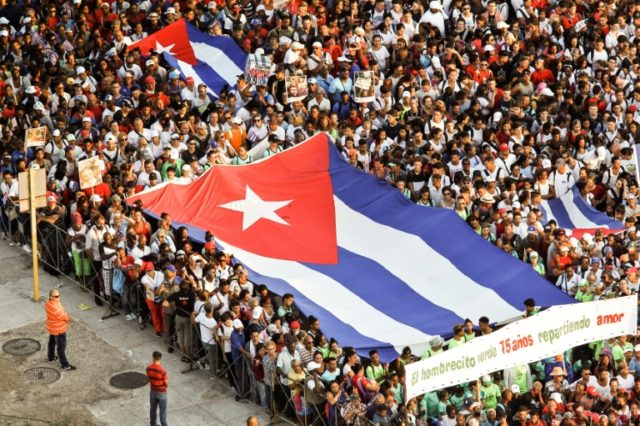Havana (AFP) – Close to a million Cubans turned out in Havana on Tuesday to mark their first May Day of the post-Castro era, in a mass show of support for the revolution and the communist island’s new president, Miguel Diaz-Canel.
The huge parade was one of the largest in Latin America, where May 1 is celebrated as an international labor holiday with traditional workers demonstrations as well as protests.
In the Cuban capital, thousands of posters of the Castro brothers and fellow revolutionary Che Guevara were held aloft by the crowds, with just a few of Diaz-Canel.
Although he is largely an unknown quantity for most ordinary Cubans, people appear confident he will follow in the footsteps of his revolutionary predecessors.
Accompanied by his predecessor Raul Castro, Cuba’s new president arrived at the capital’s Revolution Square where some 900,000 people were gathered for the annual Workers’ Day march on his first major appearance since taking power on April 19.
This year, the gathering was to show support for Diaz-Canel’s leading the country along the same path as his predecessors.
“We have a president who is following the legacy of all those who have fought for the revolution and for that, we are having a party,” said Onelia Contreras, a 59-year-old health worker marching in the parade who was wearing a hat and carrying a Cuban flag.
Addressing the crowds, Ulises Guilarte, secretary general of the Workers Central Union of Cuba (CTC) said the parade was a show of support for “comrade Raul and the continuity of our revolution in both the state and the government as presided over by comrade Diaz-Canel.”
In keeping with his historical role in the island’s history, the parade was presided over by Castro himself, who heads the powerful Communist Party, and was wearing his general’s uniform.
Next to him, Diaz Canel, who was born just after the revolution, was wearing a white shirt and a blue baseball cap of the Cuban national team.
– A wise choice –
“I think they were very wise when they decided on Diaz-Canel as president,” said Normando Garcia, a 62-year-old vet, who worked alongside him when he led the Communist Youth.
“He’s an important bastion of the revolution.”
In the crowd, parents carried children on their shoulders, some of them dressed as soldiers and one who was wearing a Fidel Castro-style beard.
As they stood on the podium alongside guests from 34 countries, a human tide of cheering supporters passed in front of them, with students, laborers, pensioners and nurses chanting slogans, beating drums and waving flags.
The crowd itself was a sea of color, with marchers holding aloft Venezuelan flags backing its embattled president Nicolas Maduro, pictures of the late Hugo Chavez and banners calling to free Brazil’s former president Lula, who was jailed last month for graft.
– Latin America marches –
Parades also took place across Latin America, with thousands rallying in support of embattled President Nicolas Maduro and his socialist government outside the presidential palace in Caracas, the capital of crisis-hit Venezuela.
“Give me 10 million votes and I will get my hooks into the economic mafia!” shouted Maduro who is running for reelection on May 20 in a controversial vote boycotted by the opposition.
“Money doesn’t buy anything,” said one demonstrator called Carlos who like millions of others has been caught up in Venezuela’s ongoing crisis, but who still remains faithful to Maduro, believing he can win the “economic war.”
In Brazil, more than 2,000 leftist supporters of ex-president Luiz Inacio Lula da Silva gathered near the prison where he is serving a 12-year sentence for corruption.
Mostly dressed in the red of his Workers’ Party, they converged on the southern city of Curitiba to mark May Day and show support for the leftist icon who remains frontrunner ahead of October’s presidential election.
In Chile, more than 12,000 workers joined two marches in the capital Santiago, calling for a “serious” dialogue with President Sebastian Pinera, and in Bolivia, President Evo Morales announced a 5.5 percent hike in salaries.
But in Central America, Honduran riot police fired tear gas to disperse thousands of May 1 demonstrators in the capital who joined an opposition-led protest against President Juan Orlando Hernandez.
Protesters were seen fleeing the choking gas, including some carrying children who had been overcome.
Journalists estimated around 20,000 workers, students and those from the rural heartlands took part in the march before being confronted by about 1,000 riot police.
burs-hmw/ia

COMMENTS
Please let us know if you're having issues with commenting.